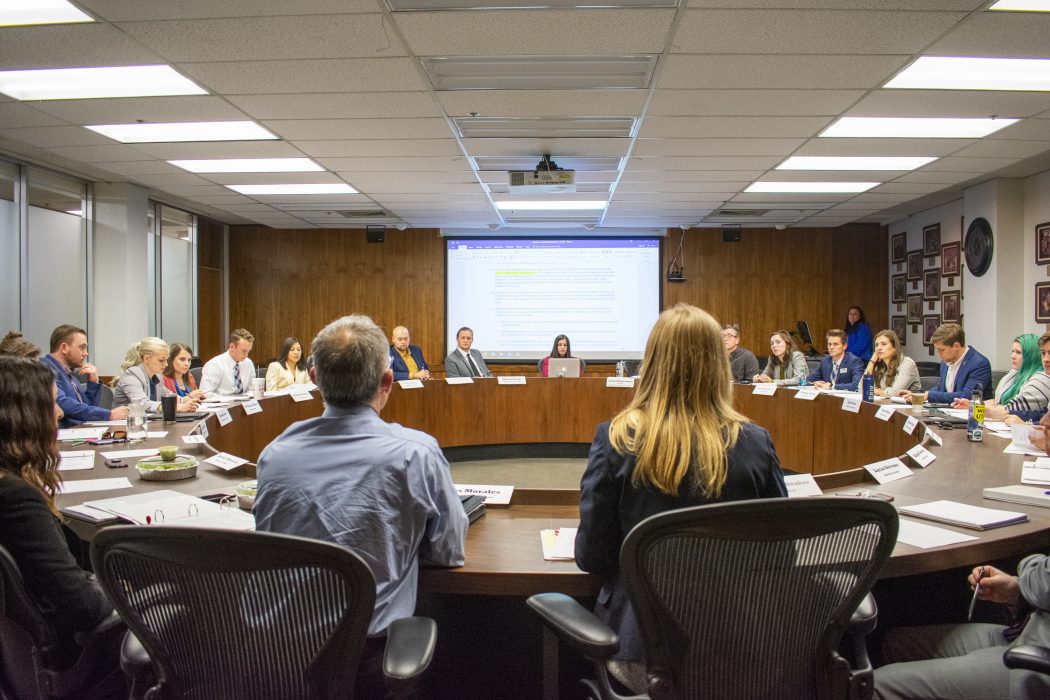USUSA passes conflict of interest resolution
When a resolution to amend the Utah State University Student Association constitution to directly address conflict of interest was proposed Tuesday. USUSA executive council voted it down, instead approving legislation from the regional campus council that would address the same issue.
The resolution, sponsored by College of Engineering Senator Erik Olson, focused on clarifying who should and should not be a member of the USUSA Hearing Board, which serves as the judiciary committee for USUSA. The regional campus bill is more detailed, including a definition of “conflict of interest” adopted from the university policy and a policy that holds all USUSA officers responsible for recusing themselves in situations where a conflict of interest arises.
“It’s already implied that the president is not a part of the hearing board, but that was just never made explicit. It’s inappropriate. It was never spelled out, so my goal was to spell it out,” Olson said.
About the regional campus bill, Olson said, “It’s generally a good policy. There are some things I disagree with, but it’s better than what we had before so that’s okay.”
Olson said he had not written the resolution to target USUSA president Jaren Hunsaker, who had been accused of conflict of interest after sitting on the hearing board for grievances filed against Rhett Ballantyne, USUSA presidential candidate and Hunsaker’s roommate. Olson said the resolution was designed to clarify the policy to avoid future conflicts and that while the 2019 elections were part of the discussion, they weren’t the sole focus.
Agriculture Senator and Executive VP-elect Dexton Lake co-sponsored the resolution. Lake, though supportive of the regional campus bill, said he also would have wanted the resolution to pass.
Lake agreed with Olson that the resolution went beyond the 2019 USUSA elections. He recalled when he was running for USUSA office in 2017 that Ashley Waddoups, then USUSA president, had sat on the hearing board for a grievance he was involved in. Although he doesn’t believe Waddoups had a conflict of interest then, he said having the president in the meeting felt strange.
“It felt like if the US president was to sit in on the supreme court,” Lake said.
Lake said two of the issues he had with the regional campus bill were clauses that would allow re-trials or allow hearing board members that recuse themselves to participate in discussion without voting. Both clauses were changed before approval.
Lake said one of the concerns about the resolution brought up in executive council was that it targeted the USUSA president position.
“I don’t look at it that way,” Lake said. “I looked at it as something that would protect the student body president and the face of USUSA. If Jaren had not been allowed to be on that board, it would have solved so many problems and I don’t think there would have been as much drama as there was.”
Kristin Hall, graduate studies senator, did not support the resolution, citing issues with the way it was written and seeing it as “unnecessary” with the proposal of the regional campus bill.
“[The resolution] felt like a band-aid on an issue that was more about just the president sitting on the board,” Hall said. “I got the same feeling from other executive council members once they saw and read through the RC one. The RC bill was more thorough and covered more of the real concerns and not just how it played out this school year. That’s what it came down to – it seemed unnecessary because the issue is not just about the president, but anyone with a conflict of interest.”
Hall said conflict of interest can be difficult to address considering the likeliness that someone on the hearing board will know the person in question, since many students involved in USUSA know each other already.
“I really think that it comes down to whether they’re able to look at the issue with as much of an unbiased view as possible,” Hall said. “It needs to be talked about more than it has been, but I think the RC legislation that did pass will have a big impact and help to avoid conflict of interest in the future.”
Now that the bill has gone through executive council, the university president may approve it for a student referendum. USUSA President Jaren Hunsaker said he is confident it will pass.
“We want to represent the students as best we can and everything we do is focused on helping and improving student life and academics by collaborating with others to make those things happen,” Hunsaker said.
@naomiyokoward
naomiyokoward@aggiemail.usu.edu

